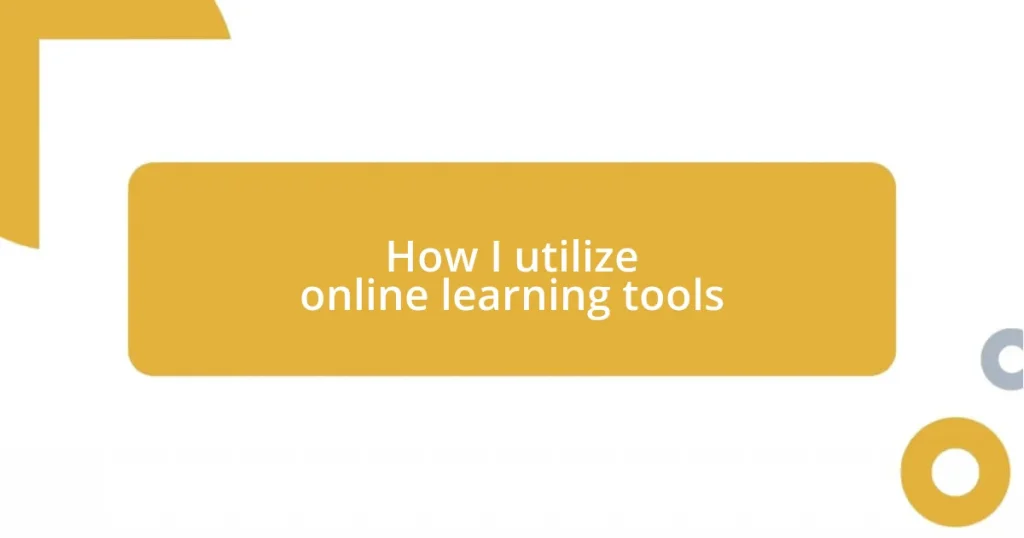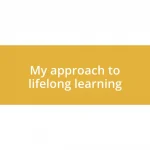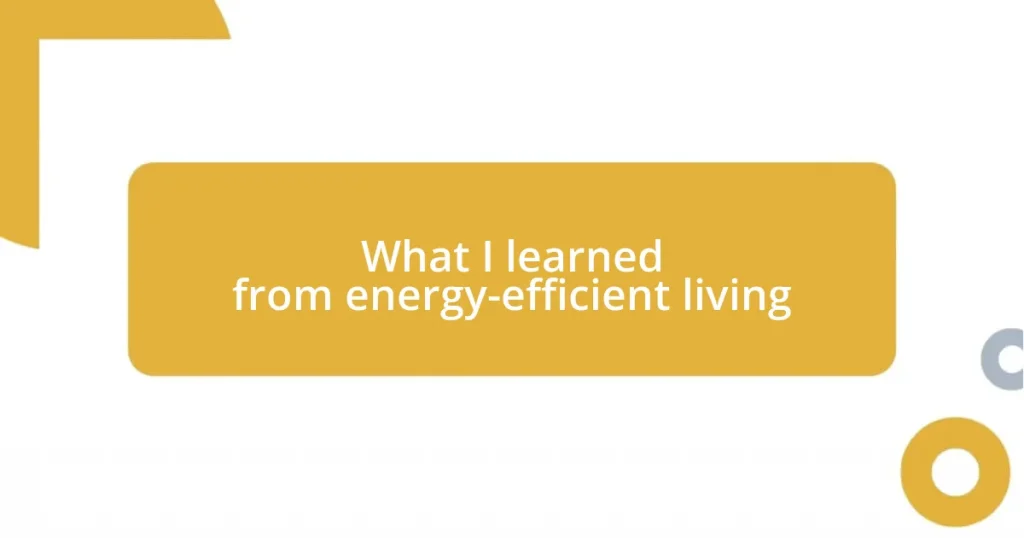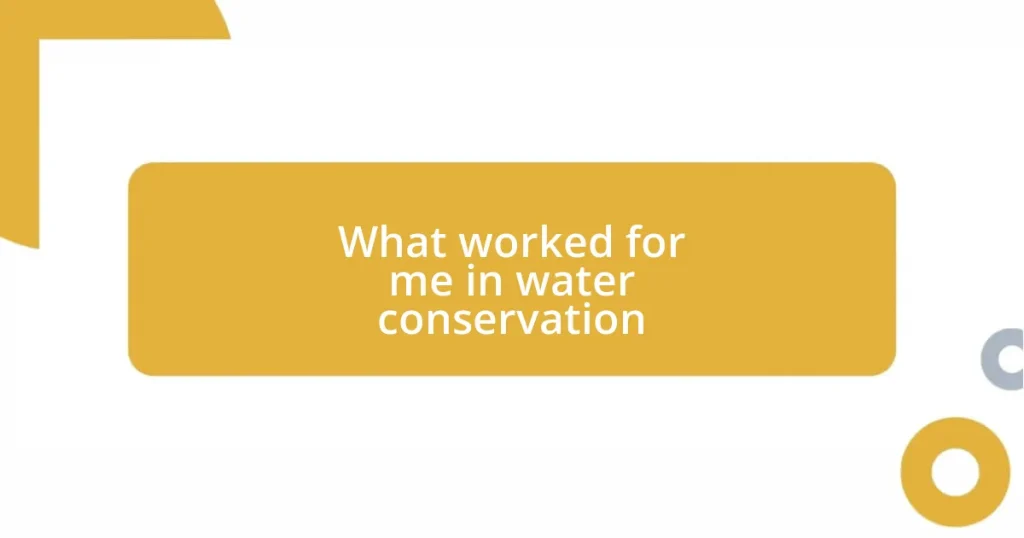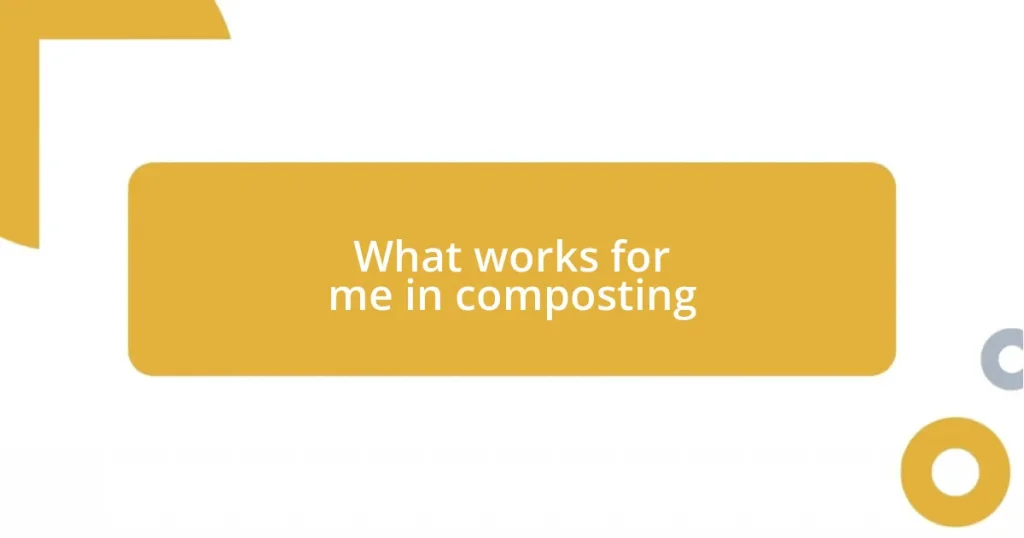Key takeaways:
- Online learning tools enhance accessibility, catering to various learning styles and promoting collaboration among users.
- Choosing the right tools involves evaluating user experience, adaptability, and integration to ensure effective learning.
- Setting clear and specific learning goals can significantly improve motivation and direction in the educational journey.
- Engagement through interactive features, tracking progress, and sharing knowledge within communities fosters a sense of belonging and enhances retention.

Understanding online learning tools
Online learning tools have revolutionized the way we approach education, making it more accessible than ever before. I remember when I first stumbled upon a virtual classroom platform; the excitement of participating in discussions from the comfort of my home was exhilarating. Isn’t it incredible how technology can break down geographical barriers?
Diving into these tools, I found they cater to various learning styles—some prefer interactive quizzes, while others thrive in video lectures. Personally, I favor platforms that blend visuals with hands-on activities because they keep me engaged. Do you find yourself drifting off during long lectures? I certainly do, which is why I always seek out tools that incorporate multimedia elements.
Collaboration also shines in the realm of online learning. I once worked on a group project using a digital workspace that allowed us all to contribute in real time. It was amazing to share ideas and insights instantly, creating a sense of community despite being miles apart. Have you ever experienced the thrill of teamwork without being physically present? That sense of connection can truly enhance the learning experience.

Choosing the right online tools
Choosing the right online tools is crucial for maximizing the learning experience. It’s like finding the perfect pair of shoes – they should fit comfortably and suit your unique needs. I’ve often spent hours exploring different platforms, only to discover that what’s ideal for one subject might not work for another. For instance, I once tried a tool that was lauded for its extensive library, but I found the interface so clunky that it hindered my motivation rather than enhancing it.
When it comes to selecting the best online learning tools, consider these factors:
- User Experience: Is the interface intuitive? A smooth experience keeps frustration at bay.
- Adaptability: Does it adjust to various learning styles? I enjoy tools that support both visual and auditory learning.
- Integration: Can it seamlessly connect with other applications I use? I appreciate tools that help streamline my workflow.
Ultimately, investing time in evaluating these aspects pays off. It’s like planting seeds in a garden; the right tools ensure your efforts bloom beautifully.

Setting clear learning goals
Setting clear learning goals is like having a roadmap for your educational journey. When I first began my online learning experience, I quickly realized the importance of establishing precise objectives. My initial goal was simply to complete a course; however, as I progressed, I learned to set specific intentions—such as mastering a particular skill or achieving a desired grade. This shift in focus transformed my approach, turning each lesson into a stepping stone toward something tangible.
I often ask myself: what do I hope to achieve with my education? This question helps me outline actionable and realistic goals. For instance, instead of saying, “I want to learn more about data analysis,” I rephrase it to “I want to complete the data analysis module by the end of the month, applying what I learn to a personal project.” This clear articulation gives me both direction and motivation. Have you thought about the power of specificity in your own learning?
Additionally, I enjoy revisiting my goals periodically to ensure they still resonate with my needs. Sometimes, a goal might evolve, and that’s completely fine! For example, I initially aimed for a high score but later realized my real interest lay in the application of knowledge rather than mere grades. This realization prompted me to shift my focus toward practical use, making my learning experience much more fulfilling.
| Goal Type | Description |
|---|---|
| SMART Goals | Specific, Measurable, Achievable, Relevant, Time-bound goals, providing clarity and structure. |
| Long-term Goals | Broad objectives that guide your learning trajectory over several months or years. |
| Short-term Goals | Immediate targets that help you achieve long-term aspirations, often setting the pace for daily learning. |

Integrating tools into daily routine
Integrating online learning tools into my daily routine has truly transformed how I approach education. Each morning, I carve out specific time slots to engage with different platforms, treating them like appointments on my calendar. I remember feeling overwhelmed at first—how do I find time amidst a busy schedule? But by dedicating just 30 minutes to a single tool each day, I not only stay organized but also create a sense of rhythm in my learning.
I’ve learned that it’s essential to blend tools seamlessly into my tasks, rather than viewing them as separate activities. For example, I often use a project management app to keep track of my progress on courses while simultaneously using a note-taking tool during lectures. This integrated approach enhances my retention of information; it’s fascinating how the layers of engagement really solidify what I’ve learned. Have you ever noticed how much more effective it is to reinforce your learning by connecting different tools in this way?
Moreover, I find that infusing online tools into everyday tasks enhances my overall productivity. Often, I’ll use a learning platform during my lunch breaks or while waiting for appointments. One day, I watched a short video tutorial between meetings and, surprisingly, it sparked an idea for a project I was working on. It’s in these unexpected moments that I discover the true power of integration. How do you currently incorporate learning into your daily life?

Engaging with interactive features
Engaging with interactive features in online learning tools has opened up new avenues for my educational experience. I remember the first time I participated in a live Q&A session—it felt electrifying to ask questions and receive instant feedback. It dawned on me that this kind of interactivity not only made the content more engaging, but it also transformed passive learning into an active conversation. Have you had the chance to experience something similar?
I’ve found that gamified learning elements, such as quizzes and polls, truly enhance my retention. For example, I recently tackled a challenging subject with a quiz that incorporated real-world scenarios. The competitive edge kept me focused, and the immediate results provided valuable insights. It’s almost like having a friendly coach nudging you along, reminding me of what I’ve mastered and where I still need improvement. Do you think you could harness that competitive spark in your own learning?
Moreover, I often explore discussion forums and peer reviews as interactive features to deepen my understanding. When I share my thoughts or critiques on a peer’s work, it feels like we are collaborating in a shared journey. Recently, I received feedback from a fellow learner that completely shifted my perspective on a concept I was struggling with. This back-and-forth dialogue brings a sense of community to the online experience, reinforcing that I’m not alone in this adventure. Have you discovered the power of engaging with others in your learning process?

Tracking progress and outcomes
Tracking my progress and outcomes has become a crucial aspect of my online learning journey. I remember the early days when I would complete a course without much thought about what I had truly absorbed. Now, I regularly set aside time each week to review my achievements. This practice allows me to celebrate small victories and identify areas needing more focus. Have you ever felt that rush of satisfaction when you see your progress laid out in front of you?
I’ve discovered that utilizing analytics provided by learning platforms is incredibly insightful. For instance, I recently analyzed my performance on a series of assessments, noticing a pattern in the topics where I struggled. This knowledge empowered me to tackle those areas head-on, adjusting my study methods accordingly. It’s surprising how raw data can illuminate the path to improvement, isn’t it? I often think about how easily I could have overlooked this vital aspect without closely tracking my outcomes.
Moreover, I jot down reflections in a dedicated journal, which has become a vital tool for self-assessment. After completing each module, I write down what resonated with me and how I can apply my new knowledge. This practice not only reinforces my learning but also guides my future study plans. I genuinely believe that taking the time to reflect has been a game-changer for my educational growth. How do you make sure you’re truly absorbing what you learn?

Sharing knowledge with online communities
Sharing knowledge within online communities has been one of the most rewarding aspects of my learning experience. I recall joining a specialized group on social media dedicated to a subject I was deeply passionate about. The dynamic discussions and various perspectives opened my eyes to ideas I hadn’t considered before. Have you ever joined a community that sparked your curiosity?
There’s something magical about exchanging insights with people from different backgrounds. Just the other day, I responded to a fellow member’s question about a complex theory. In return, they shared a resource that turned out to be a treasure trove of information! These moments remind me of how collaboration can amplify our understanding. Have you experienced those “aha!” moments when someone else’s knowledge perfectly complements your own?
Furthermore, I actively contribute by sharing my own findings and experiences, which not only enhances my learning but also strengthens the entire community. I vividly remember posting a detailed breakdown of a project I completed. The feedback and discussions that followed not only validated my efforts but also provided fresh perspectives I had overlooked. Engaging with others in this way fosters a sense of belonging and mutual growth. Have you ever taken the leap to share your knowledge, and if so, how did it feel?










